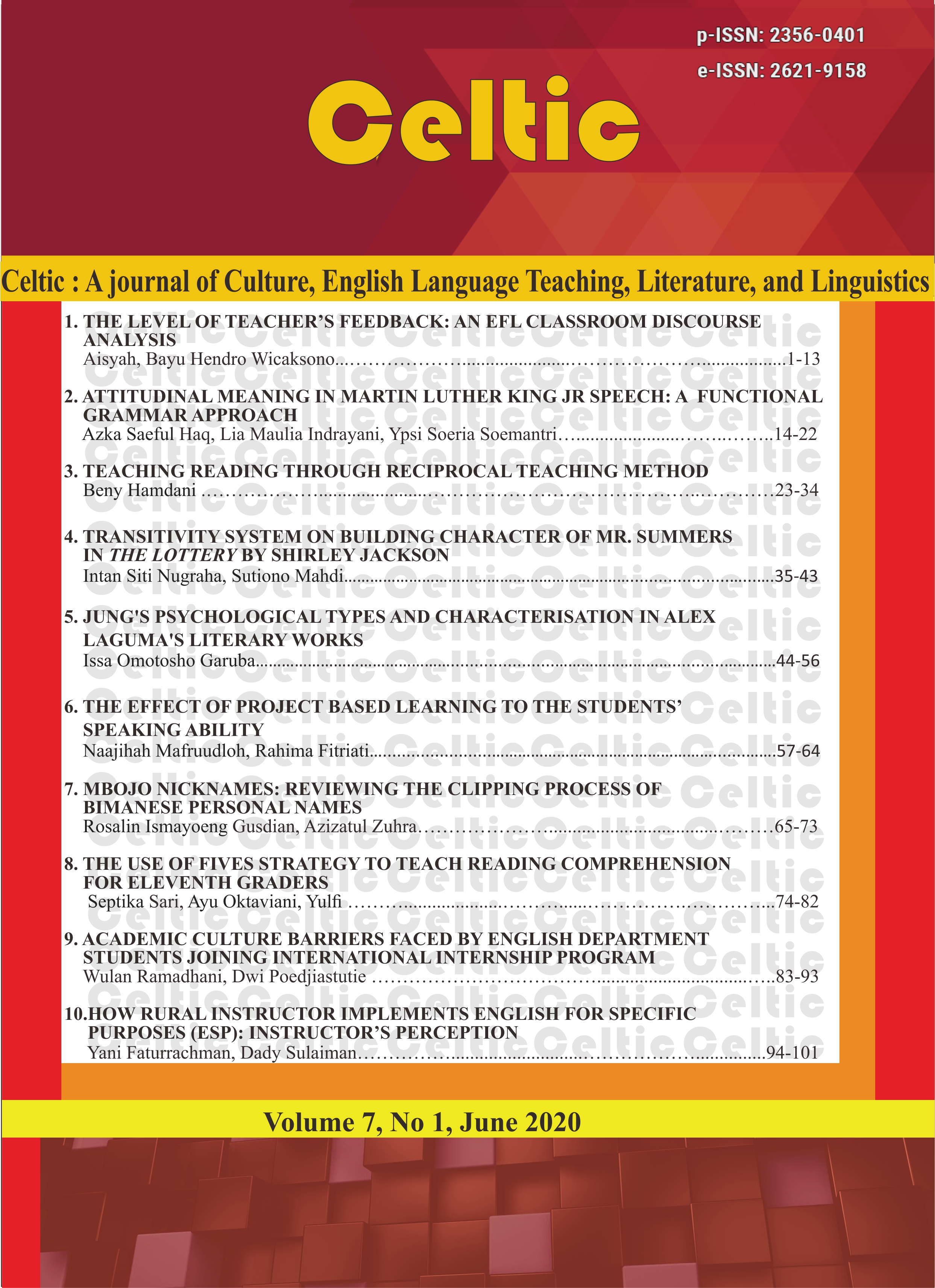ACADEMIC CULTURE BARRIERS FACED BY ENGLISH DEPARTMENT STUDENTS JOINING INTERNATIONAL INTERNSHIP PROGRAM
DOI:
https://doi.org/10.22219/celtic.v7i1.12533Keywords:
Academic Barrier, Culture, Culture BarrierAbstract
Academic culture barrier is one of the barriers that students faced when they were going abroad whether for studying or doing their internship. There are lots of students’ encounters a problem when they were doing their internship. This research was conducted to examine the academic culture barriers faced by ELED students joining the international internship program to Thailand. In conducting the research, the researcher utilized the descriptive qualitative design to obtaining formation related to the problem in academic life. The participants of this study were eight students of ELED UMM who join the international internship program in Thailand 2018. The researcher used semi-structured interviews and open-ended questionnaire in order not to limit participants in telling their experience. The results of this study are divided into 3 categories which are academic problems, solutions, and academic differences. The academic problems that the participants faced involve language, English knowledge, the use of Thai letters, curriculum, and students’ participation. The solution that they gave were using gesture in dealing with the language problem, using role-play in dealing with lack of knowledge in English, teach the students alphabet in dealing with the using of Thai letters, designing their own material in dealing with no exact curriculum, and try to interact to the students outside the class in dealing with passive students participation. Furthermore, the academic differences are the relationship between student and teacher, and school culture.
Downloads
References
Alban, D. J. (2013). Cultural Adaptations of American Teachers in International Schools. Dissertations, 193.
Cameron, H., & Kirkman, C. (2010). Managing culture shock for First Year International students entering Australian universities Managing culture shock for First Year International students entering Australian universities. 1995, 1–5.
Creswell, J. W. (2014). Research Design Qualitative, Quantitative, and Mix Methods Approaches.
Darío, R., López, A., & Peña, D. (2013). Culture shock adaptation strategies. Revista Nebrija de Linguistica Aplicada.
Darwish, A. F. E., & Huber, G. L. (2003). Individualism vs. Collectivism in Different Cultures: A cross-cultural study. Intercultural Education, 14(1). https://doi.org/10.1080/1467598032000044647
Fan, S. (2010). Language Shock : A Challenge to Language Learning. The International Journal - Language Society and Culture, 31, 42–51.
Hossain, M. (2016). English Literature and Language Review Cultural Barrier in Learning a Foreign or Second Language : An Outline and Clarification in Context of Bangladesh. 2(6), 65–70.
Kang, H., & Chang, B. (2016). Examining Culture ’ s Impact on the Learning Behaviors of International Students from Confucius Culture Studying in Western Online Learning Context. Journal of International Students, 6(3), 779–797.
Keumala, M., Samad, N. M. A., Samad, I. A., & Rachmawaty, N. (2019). The Influence of Socio Cultural and Educational Background on EFL Learners’ Motivation. Indonesian TESOL Journal, 1, 1–88. https://doi.org/10.24256/itj.v1i1.556
Kumalasari, F., & Soeparto, S. (2015). FACTORS INFLUENCING THE MOTIVATION OF THE STUDENTS FROM THAILAND IN CHOOSING ENGLISH DEPARTMENT IN UNIVERSITY OF MUHAMMADIYAH MALANG. A Journal of Culture English Language Teaching Literature & Linguistics, 2(3), 45–50.
Lambert, V. A., & Lambert, C. E. (2012). Editorial : Qualitative Descriptive Research : An Acceptable Design. Pacific Rim International Journal of Nursing Research, 16(4), 255–256.
Mirdehghan, M., Kargar, N. H., Navab, S., & Mahmoodi, T. (2011). Cultural Barriers : Pros and Cons on ELT in Iran. International Journal of English Linguistics, 1(1), 15–20.
Noom-ura, S. (2013). English-Teaching Problems in Thailand and Thai Teachers ’ Professional Development Needs. English Language Teaching, 6(11), 139–147. https://doi.org/10.5539/elt.v6n11p139
Poedjiastutie, D. (2015). Culture Shock Experienced By Foreign Students Studying At Indonesian Universities. TEFLIN Journal, 20(1), 25–36. https://doi.org/10.15639/TEFLINJOURNAL.V20I1/25-36
Raktham, C. (2015). Academic and Socio-cultural Adjustment of Chinese Exchange Students Studying in Thailand. 2nd International Conference on Language, Literature, and Cultural Studies, August, 137–151.
Rawjee, V. ., Reddy, K., & Maharaj, M. (2012). EXCHANGE STUDENTS COMMUNICATION CHALLENGES: A CASE STUDY OF A UNIVERSITY IN SOUTH AFRICA. International Conference on Commuication, Media, Technology and Design, May, 198–203.
Raymond, C. Y., & Choon, T. (2017). Understanding Asian Students Learning Styles , Cultural Influence and Learning Strategies. Journal of Education & Social Policy, 7(1), 194–210.
Samrin, Hidayat, M. S. H., & Rahmadanti, A. D. (2018). The Comparison of School ’ s Academic Culture Between Indonesia and Thailand. IOP Conference Series: Earth and Environmental Science. https://doi.org/10.1088/1755-1315/175/1/012160
Spencer-oatey, H. (2012). What is Culture ? A compilation of Quotations. GlobalPAD Core Concepts.
Srisakda, N. (2018). A Study of International Vietnamese Undergraduate Students’ Psychological, Sociocultural and Academic Adaptation and Adjustment At A Higher Education Institution in Thailand (Issue August).
Talebloo, B., & Bin Baki, R. (2013). Challenges Faced by International Postgraduate Students during their First Year of Studies. International Journal of Humanities and Social Science, 3(13), 138–144. www.ijhssnet.com
Veda, S., & Rani, K. U. (2016). COMMUNICATION BARRIERS. Journal of English Language and Literature (JOELL), June.
Watcharapunyawong, S., & Usaha, S. (2013). Thai EFL Students ’ Writing Errors in Different Text Types : The Interference of the First Language. English Language Teaching, 6(1), 67–78. https://doi.org/10.5539/elt.v6n1p67
Widowati, D. R., & Kurniasih, K. (2018). Critical Reading Skill and Its Implication To Speaking Ability in Multicultural Classroom. A Journal of Culture English Language Teaching Literature & Linguistics, 5(2), 18. https://doi.org/10.22219/celticumm.vol5.no2.18-23
Downloads
Published
How to Cite
Issue
Section
License
- Authors retain copyright to publish without restrictions and grant the journal right of first publication with the work simultaneously licensed under a Creative Commons Attribution License that allows others to share the work with an acknowledgement of the work's authorship and initial publication in this journal.
- Authors are able to enter into separate, additional contractual arrangements for the non-exclusive distribution of the journal's published version of the work (e.g., post it to an institutional repository or publish it in a book), with an acknowledgement of its initial publication in this journal.
- Authors are permitted and encouraged to post their work online (e.g., in institutional repositories or on their website) prior to and during the submission process, as it can lead to productive exchanges, as well as earlier and greater citation of published work.














